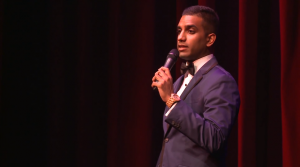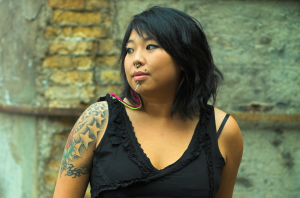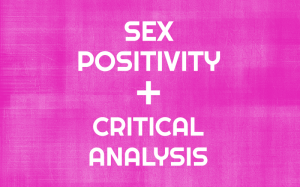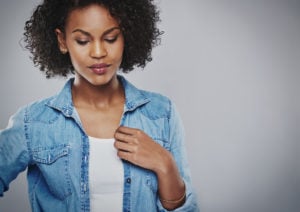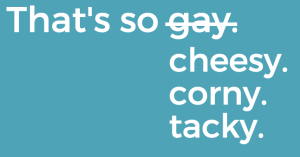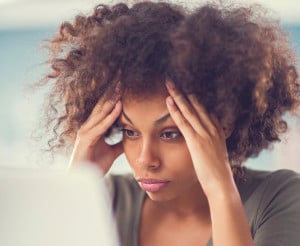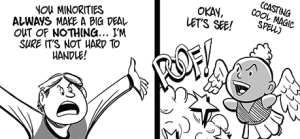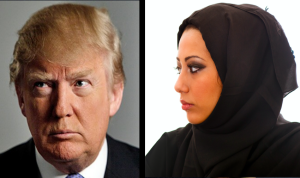Hey. I’m going to make a video about liking problematic media and things like that. I got a few questions about this a while ago but I haven’t had a chance because exams and stuff to make a video.
I think it’s a really important thing to talk about, especially since I for one definitely still watch all the shitty shows that I’ve always been watching. Well, a lot of them are new shows, I guess. I consume a lot of shitty media including all that like Bravo, TLC, stuff.
As my feminism has progressed and as I’ve grown as a person, the way that I watched these shows has changed a lot, but that doesn’t mean that I stop enjoying them. I think it’s important to talk about what that process is and how you can like something that’s problematic without yourself contributing to the problems that it perpetuates maybe.
I think the first rule or guideline is to acknowledge. You have to acknowledge that whatever it is that’s problematic is problematic and acknowledging does not mean saying, “Yeah, but.” It means accepting it, you don’t make excuses for it, you don’t try to justify it.
It’s really irritating when you come across someone who’s like, “No, The Big Bang Theory isn’t offensive at all. What are you talking about,” when all of the jokes are based on stereotypes.
My family, not all of them but a lot of them, watch that show. I can sit through it but when every single joke about that one Jewish guy is based on his naggy Jewish mom and every joke about the Indian guy is about him being Indian, it’s really shallow to me, but that doesn’t mean that they can’t watch it. It just means that I’m seeing a layer of it that turns me off of it.
When I say that to them and if my dad were to be like, “No. You’re being sensitive,” that’s not the right way to respond to something like this. I’m not saying you can’t watch this anymore or you’re being sexist for watching this or liking this. I’m just saying you have to acknowledge what it is that’s problematic in order to avoid perpetuating it.
It’s really important because what we watch and the narratives that we surround ourselves with and that we identify with, they really influenced the way that we think about ourselves and the world around us. That even goes for fantasy shows.
It’s really important that people understand what they’re consuming, but it’s also important because some of the problems that arise in these shows and stuff like that are problems of like there’s no minorities represented or the minorities are represented in a poor light.
That might not seem that important to my dad or something, but for people of color who want to be able to identify with someone on TV and they only get to identify with shallow stereotypes of their culture like the Indian guy on Big Bang Theory, that’s not okay and that’s unfortunate and that’s something that that alone doesn’t say you’re a bad person if you watch that show. It’s just saying you have to understand that so that you can have an open dialogue and you can be open to change when it actually can come about.
As for sci-sci fi and things like that, maybe not only sci-sci fi. There are heroes in all kinds of TV shows, but it’s important, I think, maybe even more important that there are people of color who are represented in those lights as in heroic lights because mainstream media rarely does acknowledge them in that way. I’ll talk about that in a bit.
The second point is that you should not derail conversations about these problematic things. Even if you have your self acknowledge that the show Girls is problematic and then someone starts talking about it and you’re like, “Okay, I know, but I still like it. Shut up,” that’s not a good way to react.
Even if you think you now why something is problematic, you have to be open to listening to someone and you have to be open to hearing new things that you haven’t yourself thought of. It’s not okay to be like, “Okay. I admit that she does a lot of shitting problematic stuff in and out of the context of her show.” You have to actually be able to say that and then listen respectfully to what other people are contributing to that conversation because it is a conversation.
It’s not just something that you say and then that’s the end. This is a dialogue. That’s what feminism is about. It’s about talking to each other and listening to each other.
If you shut someone off when they are trying to explain why something that you’re consuming and they are consuming is hurting them in some way, you’re basically saying that their feelings and their pain and their oppression even are less important than you liking this show or movie.
I’m sure that’s not your intention when you do it, but that’s ultimately what’s happening there and you need to understand that so that you can change that behavior and be more respectful to them.
Also you need to respect when people are so upset by some media that they won’t consume it. I know a lot of people who won’t watch Girls because they know that Lena Dunham has said really shitty things, she’s done shitty things and the show itself is problematic so they don’t watch it.
I watch it. I thought the second season was pretty shitty, to be honest. I like the first season, but if I encountered someone and they were telling me that they don’t watch it for these reasons, I wouldn’t be like, “Oh come on, watch it tough. It’s so funny. You have to watch it,” or make them feel like they’re being too sensitive for not watching it. That’s not the right way to react to that.
In the same way that you want to be able to consume whatever media you want regardless of its problematic aspects, you have to also allow people to not consume media that offense them in some way.
I would never put on Big Bang Theory in my own free time. I wouldn’t choose it. If it’s on I’m not going to freak out at my brother every single time he puts it on and he shouldn’t freak out at me for never putting it on because if I just choose to not consume that then I have the right to do that too.
Ultimately, it’s really important the accept the media that you consume for what it truly is, which means not making apologies for it or trying to justify anything that is problematic about it. You can still like it and you can still find positive things in it, even if those positive things are flipping.
I really liked the first season of Girls because I found it funny. I laughed almost every episode that’s why I liked it, that’s I watched it. I can understand why it’s problematic and still find it funny. That’s why the second season was shitty to me because it just wasn’t very funny at all. It was just mostly like, I don’t know … Okay, well this isn’t supposed to be about a review of the Girls.
Then I wanted to just add some more. The stuff that I’ve been talking is probably stuff that you have read or could easily read, so I just wanted to add more of my own personal experiences with this.
In my experience, you don’t have to try or be actively trying to critically analyze all of your favorite shows. That’s a good thing to do, but I think for me if you’re in a process of learning, if you’re in a process of listening which is what feminism is about, it’s about listening respectfully, it’s about having that dialogue, you will just see these things. You’ll see the way that the world or society, the patriarchy makes itself apparent in the media.
It’s not like you’re going to have to sit there and have a list in front of you of all the different-isms and try to point them out. It’s just be aware of these things around you in daily life, which I’m sure a lot of you, if not all of you, are. Read more feminism. Talk to other feminists about these things and when you’re watching these shows they’ll make themselves known to you.
An example of this is these things, these problematic aspects are not always explicit. I thought I would bring up an example of one of my favorite shows which is Homeland. If you haven’t watched Homeland you might want to skip this. I’m trying not to be a spoiler but it’s inevitable.
Homeland is one of my favorite shows and there’s not really much wrong that’s explicit in its dialogue or its portrayals of women or something like that. I’m sure there are things, but the main problem is implicit. The main problem is that it’s a show about a terrorist. It’s essentially a show that humanizes a terrorist and it’s a show about a white man.
There’s nothing inherently wrong with that plot, but the problem stems from the fact that this would not be made with a person of color as the central role, as the terrorist and you can see that from the news. Look at the news: person of color commits a crime. Person of color leaves the country before a crime. Terrorist. Trained for terrorism.
All these things are not only assumed. There may be evidence for these things but they’re bombarded on the news. That’s all we hear about is how they are terrorist, how they were trained, sent by their country or somehow relating it to their heritage, their ethnicity, their religion.
I’m not saying that any of the recent cases of these were not trained acts of terrorism because I really don’t know, but what I’m saying is now we have to look at the white guys who have recently committed heinous crimes. What did they say about them? Mentally ill. There were nice guys, they were troubled youth. They had promising football careers, things like that.
n other words, what’s happening there? The white men who are creating just as heinous crimes are being humanized. They’re not being branded as inhumane, terrorist, evildoers and more importantly even the color of their skin is not translating to my actions speak for everyone else who looks like me. That’s the biggest problem.
When a white guy shoots up a school, it’s not saying, “Oh, all white guys are terrorists.” When a person of color does some heinous crime, all people of color are at risk now of being attacked on the street, which is true. This happened in Boston. It took two days after the Boston marathon bombing for a person of color to be attacked on the street for just how they look and being somehow associated with the way that terrorist supposedly looks.
Basically, Homeland is a really compelling show. I like it. I think it’s really interesting and fun to watch, but it’s important that I follow the feminist dialogue that surrounds these kinds of issues because I need to be aware of the fact that a show that humanizes and sympathizes with a white criminal is not really very different from everyday news. It’s not different at all. That doesn’t mean that I can’t watch Homeland and enjoy it. It just means that I have to recognize what’s going on there so that I don’t perpetuate it.
The last thing I wanted to talk about was how it’s totally okay to shut this part of your brain off sometimes. I love shitty Bravo, TLC shows, which I mentioned earlier. This includes Real Housewives, Millionaire Matchmaker, even Teen Moms, stuff like that. These shows are pretty problematic. Maybe extremely problematic.
They’re literally all the same. All the shows are the same and they all portray the same dumb, stereotypes of women. The trope that women are unintelligent, superficial and most of all, in all of these shows women are catty and they hate each other and they’re competitive over man and over status, things like that.
Hey, I like these shows. I like watching them. I like following the stupid drama. I think it’s fun. I like to allow myself to tune out of all the shift that’s going on in my life so that I can just watch these shows and get into that mindset for a while. It’s okay to do that, really. It’s okay for me to watch that without analyzing it because I’m also open to laugh at how ridiculous these things are.
It would be different, I think, if I wasn’t aware. I don’t have to be critically analyzing, but the fact that I’m aware makes me able to distant myself from what it’s actually telling me to just what I’m getting from it, which is just entertainment.
It’s important to remember that we like doesn’t define us as people. You don’t have to defend the things you like from every criticism or pretend that they’re perfect because they’re not. Nothing is perfect. Everything has problems. Even some of the most amazing filmmakers that I look up to and have studied in school and have written essays about.
They are not perfect and even if I think they’re movies are incredible, there are still problems that can be found in them and that’s okay. It doesn’t take away from the amazing artistic vision of the film or the show or anything like that. It just means that you’re looking at it not through a rose tinted glass, a glass is, but you’re looking at it and you’re just really seeing it for what it is.
Basically, you can like problematic things without perpetuating the problematic aspects of them. I can watch Real Housewives without leaving that context thinking that all women are catty gold-diggers. I can do that, but I didn’t learn that form TV and that’s the most important part.
I didn’t learn that from that show. I didn’t learn that from any TV because TV doesn’t tell us those things. I learned that from feminism and I learned it from having a respectful, open dialogue with others about those issues. I’m going to keep watching those shows but I’m also going to continue to have that dialogue so that I can grow as a person while I watch these things.
I hope that was helpful. I’m trying to make videos a bit shorter but then I always do this at the end so it doesn’t really do it. Hope everyone has a good Monday? Is it Monday? Oh my god. I’m already checked out of school mode and I still have an exam left. Bye guys.







